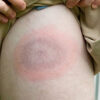A medication for lower back pain could be ineffective and cause side effects.
A new study found that gabapentinoids –- an analgesic typically prescribed for lower back pain — may actually be ineffective and could cause unwanted side effects. A research team from Canada examined data from eight randomized trials that investigated the use of gabapentinoids in patients with chronic lower back pain. The study, which is published in the journal PLOS, found that gabapentin showed no significant improvement of pain in 3 out of the 8 trials. Additionally, researchers found that it could cause some side effects, including dizziness, fatigue and confusion. Posted August 16, 2017. Via Express.
Acupuncture, Electrotherapy after Knee Replacement Can Reduce or Delay Opioid Use. A new study published by JAMA Surgery found that acupuncture and electrotherapy could potentially reduce, or at least delay, opioid use after knee replacement surgery. A research team from Stanford University evaluated the effectiveness of commonly used drug-free alternative treatments for post-surgical pain post by examining data from 39 clinical trials, which consisted of 2,391 patients who had total knee replacements. Alternative treatments included continuous passive motion (CPM), preoperative exercise, cryotherapy, electrotherapy, and acupuncture. According to the results, electrotherapy and acupuncture “moderately” improved postoperative pain management and reduced opioid use. Cryotherapy reduced opioid use, but failed to alleviate pain. CPM and preoperative exercise did not reduce pain or reduce opioid use. Posted August 16, 2017. Via Medical Xpress.
Antidepressant use has risen significantly. According to new data from the National Center for Health Statistics (NCHS), the rate of antidepressant use has increased by 65% over the past 15 years. Antidepressant use increased with age in both men and women, from 3.4% among people aged 12 to 19 years to 19.1% among those aged 60 years and older. Additionally, women were found to be using antidepressants far more often than men. From 2011 to 2014, women were about twice as likely as men to report past-month antidepressant medication use (16.5% vs 8.6%). Posted August 15, 2017. Via Medscape.





